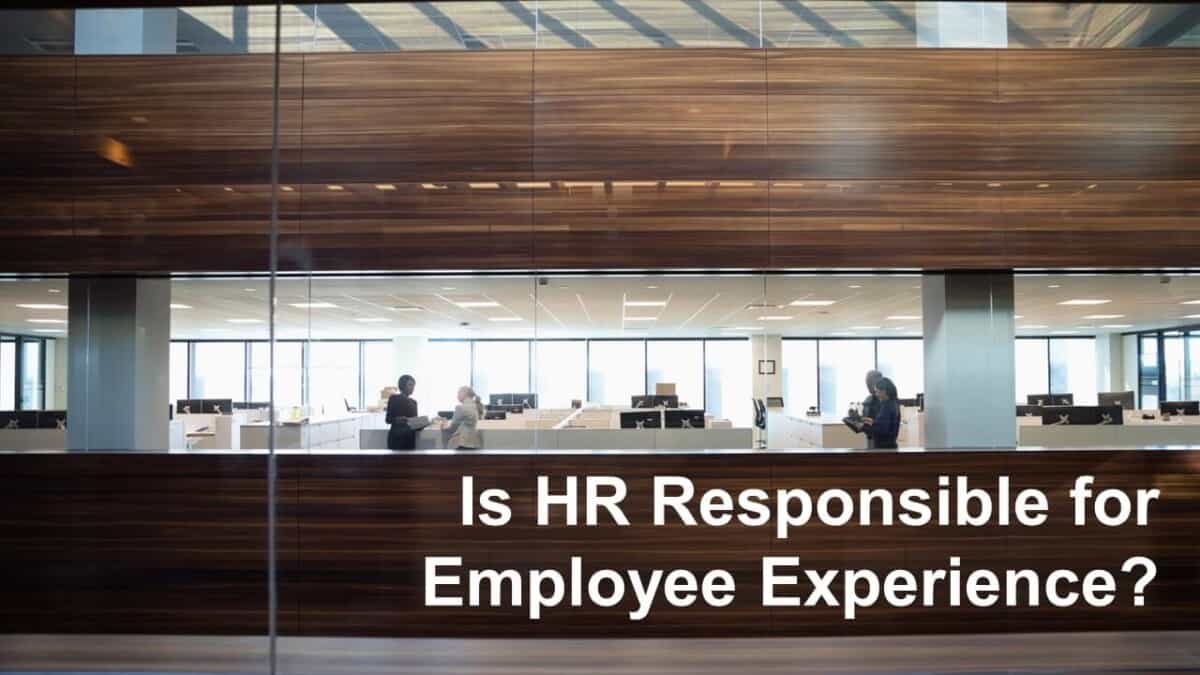Share:

In the aftermath of the COVID-19 pandemic, we’ve learned that we need to get better at engaging and retaining talent to adapt, survive, and thrive in the future. The best and most effective way to do this is to create a positive employee experience.
With so many of those who left their jobs during the Great Resignation citing toxic work environments as a motivating factor in their decision to leave their job, organizations are paying more attention to employee experience and are becoming more aware of how important it is to support a positive employee experience for team members as part of their overall plan for future success.
Whether the experience is good or bad, employee experience profoundly impacts an organization’s profitability, because it affects efficiency, engagement, performance, productivity, recruitment, and retention. The quality of the employee experience an organization provides can even shape an organization’s reputation.
Because it is such a vital part of any good sustainable business strategy, organizations need to invest more in a positive employee experience for all employees and take ownership of the experience management process. But who should own the process and take responsibility for ensuring a positive employee experience in an organization?
HR is responsible for employee experience typically. Some organizations hire employee experience managers to oversee the creation of the employee experience. But it’s not just HR’s responsibility to create a positive experience. It requires a collective effort from the entire organization.
The article will discuss employee experience and how organization-wide ownership of the employee experience process is essential for managing it effectively.


What Is Employee Experience and Why Does It Matter?
An employee experience consists of all the interactions that happen during the employee lifecycle, the experiences that involve an employee’s specific role, and how they feel about these experiences.
It includes (but is not limited to) the employee’s experience of the recruitment process, onboarding, performance management, day-to-day encounters with co-workers, managers, senior leadership, and customers, the work environment, the workplace culture, the technology they use, the exit interview process, and any interactions the employee has with the employer after the employee leaves the organization.
All these factors affect an employee’s well-being, job satisfaction, engagement, motivation, productivity, and performance, which can affect a business’s overall performance, retention rates, and profitability.
Organizations that make efforts to create a positive employee experience see an increase in stock prices and faster revenue growth. When Campbell’s Soup prioritized employee experience, its stock price increased by 30% during a time when most other stocks fell 10%.
Is HR Responsible for Employee Experience?
In most organizations, employee experience is the primary responsibility of HR departments. HR managers oversee many of the functions and processes that impact employee experience.
They also play an essential role in guiding the entire employee experience, from the moment a candidate applies for a job with the organization to the moment they conduct the employee’s exit interview.
But it isn’t just the responsibility of HR. When you consider that employee experience consists of all the interactions and experiences an employee has during the course of a day in their role, it’s clear that everyone within an organization can potentially impact an employee’s experience there.
According to Forbes contributor Jacob Morgan, who has researched the employee experience and HR’s role in the process, says that a collective effort is required to create a positive employee experience:
“In every single organization that I have worked with or researched, this is owned by HR. But with a caveat. Even though HR owns the employee experience it’s not just up to HR to create this. In soccer, the goalie owns any soccer ball that comes flying at the net but it’s actually everyone’s job to keep the ball from going into their own goal, if it does, the whole team (not just the goalie) loses. The same is true for employee experience. Although HR is being tasked as the employee experience torch bearer this isn’t just an HR responsibility.”
Many companies hire employee experience managers, who are typically part of HR departments.
Employee experience managers develop strategies that help them understand employee sentiments and satisfaction so they can effectively manage the entire employee experience for an organization, including recruitment, development, coaching, and retention.
They gauge employee attitudes toward their jobs and their level of satisfaction by utilizing tools like employee surveys, feedback, rewards, and KPIs for tracking and improving employee engagement, performance, and productivity.
The goal is to identify employee needs and foster a positive work environment and organizational culture where employees feel a sense of belonging and are equipped with what they need to perform well.
Unfortunately, not every company has an employee experience manager who is focused on creating a positive employee experience for an organization’s staff. And, while every company has some HR-related duties to fulfill, not every company has a designated HR department, and they are not required to.
Some companies often just have one individual who handles HR duties for the entire company, along with other leadership or managerial duties. In this scenario, it becomes even more crucial for employee experience to be a team effort and to build teams of individuals who are mindful of the ways they can impact the employee experience of their co-workers.


Who Else Is Responsible for Employee Experience?
Whether your organization has hired an employee experience manager or does not even yet have employee experience on its radar, the organization’s leadership and an employee’s co-workers will profoundly impact the employee experience of all its employees, for better or worse.
Leadership
Leadership affects the employee experience more than any other factor because of the way leadership defines organizational culture. An employee’s day-to-day interactions with their direct supervisor or manager, in particular, affect an employee’s experience in negative and positive ways, depending on the quality of those interactions.
Good leaders consistently communicate cultural norms in ways that create a positive work environment where employees are engaged, have a high degree of loyalty, and feel a sense of purpose in their work. They reinforce core values by modeling behaviors that are consistent with core values and embody the organization’s culture in every aspect of their leadership.
While a more traditional approach to leadership that emphasizes hierarchy, control, and stability may seem comfortable to some and more reliable because it yields consistent, predictable results in the short term, it’s not the best approach to creating a positive employee experience.
Traditional leadership approaches may give you the results you want now, but they can have a less predictable and less favorable impact on employee experience because they are more focused on business outcomes than on how we as leaders should lead and develop employees to do their best work and achieve the desired business outcomes.
But if you want your team to achieve positive business outcomes, the best way to do that is by supporting a positive employee experience.
The Team
In addition to their interactions with leadership, an employee’s interactions with their co-workers can impact the employee experience. This is an important fact to keep in mind when recruiting. Hiring for cultural alignment and ensuring the organization is providing a welcoming, inclusive work environment for all can go a long way.
Employees need to feel a sense of belonging and psychologically safe to engage, collaborate, and do their best work. Building inclusive teams that support each other and are invested in creating a positive employee experience for all is the key to good employee experience management.
When the interactions that make up the employee experience are positive, it improves job satisfaction and reduces turnover, as employees who experience support from their co-workers are more likely to stay with an organization for the long haul.
Having supportive co-workers can also boost the employee experience in the form of “daily uplifts”—positive experiences in the workplace that make employees feel good.
These micro-experiences include receiving positive feedback about performance, recognition from a supervisor, or just having positive mutual exchanges with co-workers.

Matt Tenney has been working to help organizations develop leaders who improve employee engagement and performance since 2012. He is the author of three leadership books, including the groundbreaking, highly acclaimed book Inspire Greatness: How to Motivate Employees with a Simple, Repeatable, Scalable Process.
Matt’s ideas have been featured in major media outlets and his clients include numerous national associations and Fortune 500 companies.
He is often invited to deliver keynote speeches at conferences and leadership meetings, and is known for delivering valuable, actionable insights in a way that is memorable and deeply inspiring.


